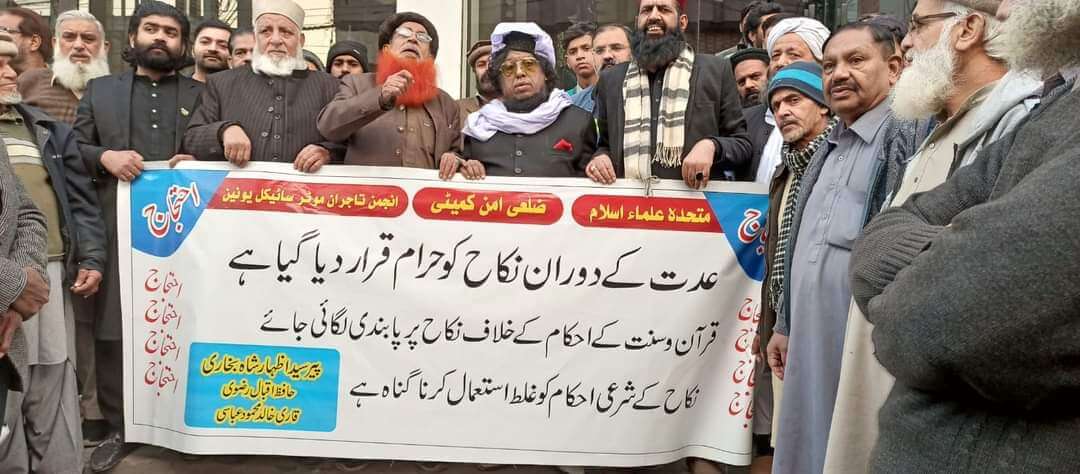Nikah in Iddat is forbidden.
Sunni Ulema Council organized a protest rally against Nikah during Iddat because former premier Imran Khan married his wife during her Iddat period.
Pak Chronicle Desk
Rawalpindi
The Sunni Ulema Council staged a protest rally against Nikah during the period of Iddat in the background that the former Prime Minister of Pakistan had allegedly entered into wedlock with Bushra Bibi during her Iddat Period.
District-renowned Islamic scholars, including Hafiz Iqbal Rizvi and Syed Izhar Bukhari, led the rally.
The rally participants staged a protest demonstration outside the Waris Khan police station. This protest demonstration was also discussed on social media platforms, especially on Twitter. Some social media users shared details about this happening in their tweets.
While addressing the participants of the rally, religious scholar Hafiz Iqbal Rivi stated that marriage during the Iddat period is forbidden in Islam.
He said the marriage, which took place against the rules of the Quran and Sunnah, should be banned.
“Violation of Sharia rules of marriage is a sin,” Hafiz Iqbal Rizvi further stated.
He was of the view that why the witnesses did not tell the truth to the scholar who taught marriage during the Iddat period. He said Maulana Saeed confirmed the marriage during Iddat.
“We welcome the approval of the bill by the National Assembly for the honor of Ahl al-Bayt and Companions,” Syed Izhar Bukhari stated in his address to the rally.
He maintained that marriage in the Iddat period violates Shariah and law.
He believed the Federal Shariat Court should take notice of performing Nikah during Iddat. He was referring to the marriage of the former premier.
The rally was participated by religious scholars, traders’ associations, and others.
According to Wikipedia, In Islam, iddah or iddat is the period of waiting for a woman, which she must observe after the death of her husband or after a divorce.
During this period, she may not marry another man. One of its main purposes is to remove any doubt about the paternity of a child born after the divorce or death of the prior husband.
The length of ‘iddah or iddat varies according to a number of circumstances. Generally, the iddah of a divorced woman is three lunar months which are about 89 days, but if the marriage was not consummated there is no ‘iddah.
For a woman whose husband has died, the ‘iddah is four lunar months and ten days (i.e. about 128 days) after the death of her husband, whether or not the marriage was consummated.
If a woman is pregnant when she is widowed or divorced, the ‘iddah lasts until she gives birth.
Islamic scholars consider this directive to be a balance between mourning of husband’s death and protecting the widow from criticism that she might be subjected to from remarrying too quickly after her husband’s death.
This is also to ascertain whether a woman is pregnant since four and a half months is half the length of a normal pregnancy.
Ends
راولپنڈی میں سنی علما کونسل کا عدت کے دوران نکاح کے خلاف شدید احتجاج pic.twitter.com/kP52PJ6zF5
— Haseeb Hanif (@haseebhanif1234) January 26, 2023



































